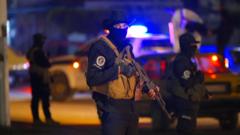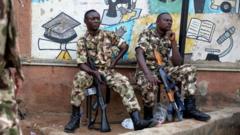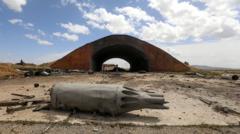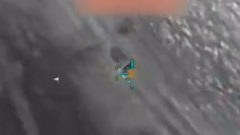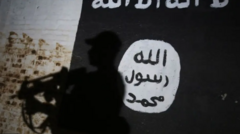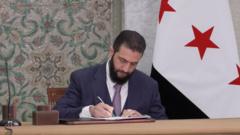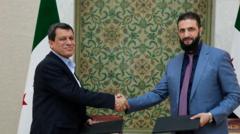The recent restructuring of Syria's military under the Islamist group Hayat Tahrir al-Sham (HTS) has seen foreign fighters take on key roles, prompting apprehension domestically and internationally.
**Foreign Islamist Fighters Appointed to Senior Roles in Syrian Military, Reports Reveal**
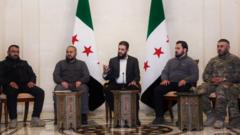
**Foreign Islamist Fighters Appointed to Senior Roles in Syrian Military, Reports Reveal**
Reports indicate that senior positions in Syria's armed forces have been allocated to foreign Islamist fighters, raising concerns about the implications for the country's future governance and stability.
While the new Syrian leadership remains silent on these appointments, reports suggest that Ahmed al-Sharaa, the de facto leader, is emphasizing a unified state that respects the diverse communities within Syria. This article examines the potential consequences of these appointments and the conflicting sentiments they evoke.
Analyzing the latest developments in Syria, sources are suggesting that foreign Islamist fighters have been granted significant military positions in a dramatic restructuring led by Hayat Tahrir al-Sham (HTS), which has recently gained control following the overthrow of former President Bashar al-Assad. Reports indicate that out of nearly 50 newly created military roles, a minimum of six have been assigned to foreign nationals, including colonels and brigadier-generals from various countries such as China, Jordan, and Turkey.
The involvement of foreign fighters in Syria has long been a contentious issue, particularly during the civil war, when many joined to combat Assad's regime. Concerns regarding the imposition of extremist ideologies have emerged, prompting widespread debate over the implications of HTS's decisions on the character of Syria's fledgling government.
Newly appointed leader Ahmed al-Sharaa is reportedly engaging with diverse community representatives, including Kurds and Christians, to foster a sense of inclusivity. Initial dialogues with the Kurdish-led Syrian Democratic Forces (SDF) have been characterized as positive, indicating a potential shift in the political landscape. However, the SDF, being backed by the US, is viewed as a terrorist organization by Turkey, raising concerns over the prospect of escalating tensions.
Sharaa, through his leadership in HTS, has previously marginalized foreign jihadist elements to reframe the organization’s identity towards nationalism. He has signaled a commitment to establish a unified Syrian state that reflects the demographics of its diverse population, countering fears that his administration may align with extremist factions.
While the mass incorporation of foreign fighters appears to be a strategy to reward those who contributed to HTS's success, this move may evoke skepticism among various groups within Syria, particularly those wary of Islamist ideologies. Observers are focusing on promises of a National Dialogue Conference intended to unite divergent societal factions and facilitate institutional rebuilding in Syria. However, lingering questions about these appointments cast a shadow on Sharaa’s intentions and the stability of the region.
As Syria transitions towards a new political framework, challenges persist in establishing a coalesced governance model that ensures security for all communities involved, particularly minority populations that have historically felt endangered by radical ideologies.
Analyzing the latest developments in Syria, sources are suggesting that foreign Islamist fighters have been granted significant military positions in a dramatic restructuring led by Hayat Tahrir al-Sham (HTS), which has recently gained control following the overthrow of former President Bashar al-Assad. Reports indicate that out of nearly 50 newly created military roles, a minimum of six have been assigned to foreign nationals, including colonels and brigadier-generals from various countries such as China, Jordan, and Turkey.
The involvement of foreign fighters in Syria has long been a contentious issue, particularly during the civil war, when many joined to combat Assad's regime. Concerns regarding the imposition of extremist ideologies have emerged, prompting widespread debate over the implications of HTS's decisions on the character of Syria's fledgling government.
Newly appointed leader Ahmed al-Sharaa is reportedly engaging with diverse community representatives, including Kurds and Christians, to foster a sense of inclusivity. Initial dialogues with the Kurdish-led Syrian Democratic Forces (SDF) have been characterized as positive, indicating a potential shift in the political landscape. However, the SDF, being backed by the US, is viewed as a terrorist organization by Turkey, raising concerns over the prospect of escalating tensions.
Sharaa, through his leadership in HTS, has previously marginalized foreign jihadist elements to reframe the organization’s identity towards nationalism. He has signaled a commitment to establish a unified Syrian state that reflects the demographics of its diverse population, countering fears that his administration may align with extremist factions.
While the mass incorporation of foreign fighters appears to be a strategy to reward those who contributed to HTS's success, this move may evoke skepticism among various groups within Syria, particularly those wary of Islamist ideologies. Observers are focusing on promises of a National Dialogue Conference intended to unite divergent societal factions and facilitate institutional rebuilding in Syria. However, lingering questions about these appointments cast a shadow on Sharaa’s intentions and the stability of the region.
As Syria transitions towards a new political framework, challenges persist in establishing a coalesced governance model that ensures security for all communities involved, particularly minority populations that have historically felt endangered by radical ideologies.

